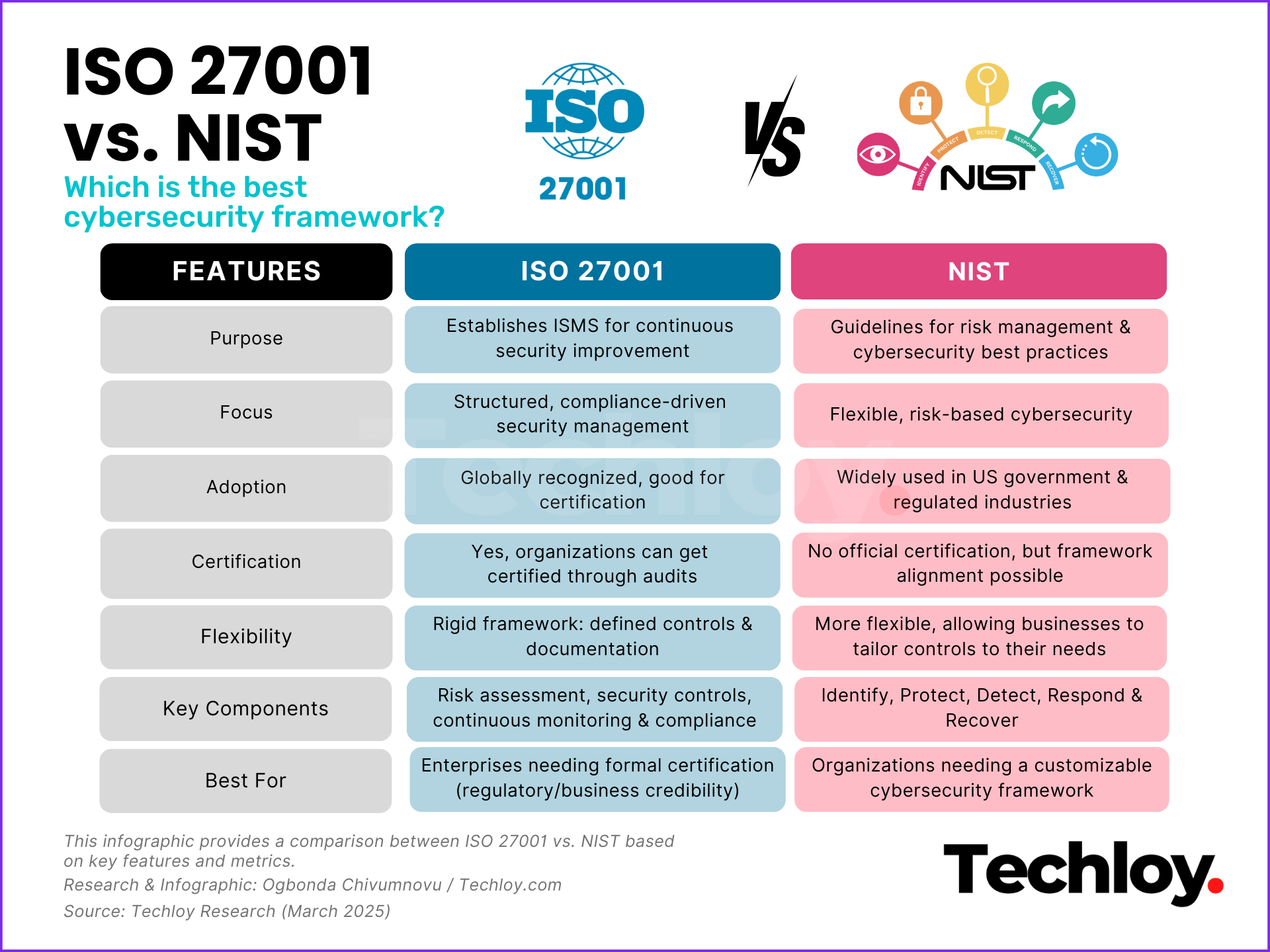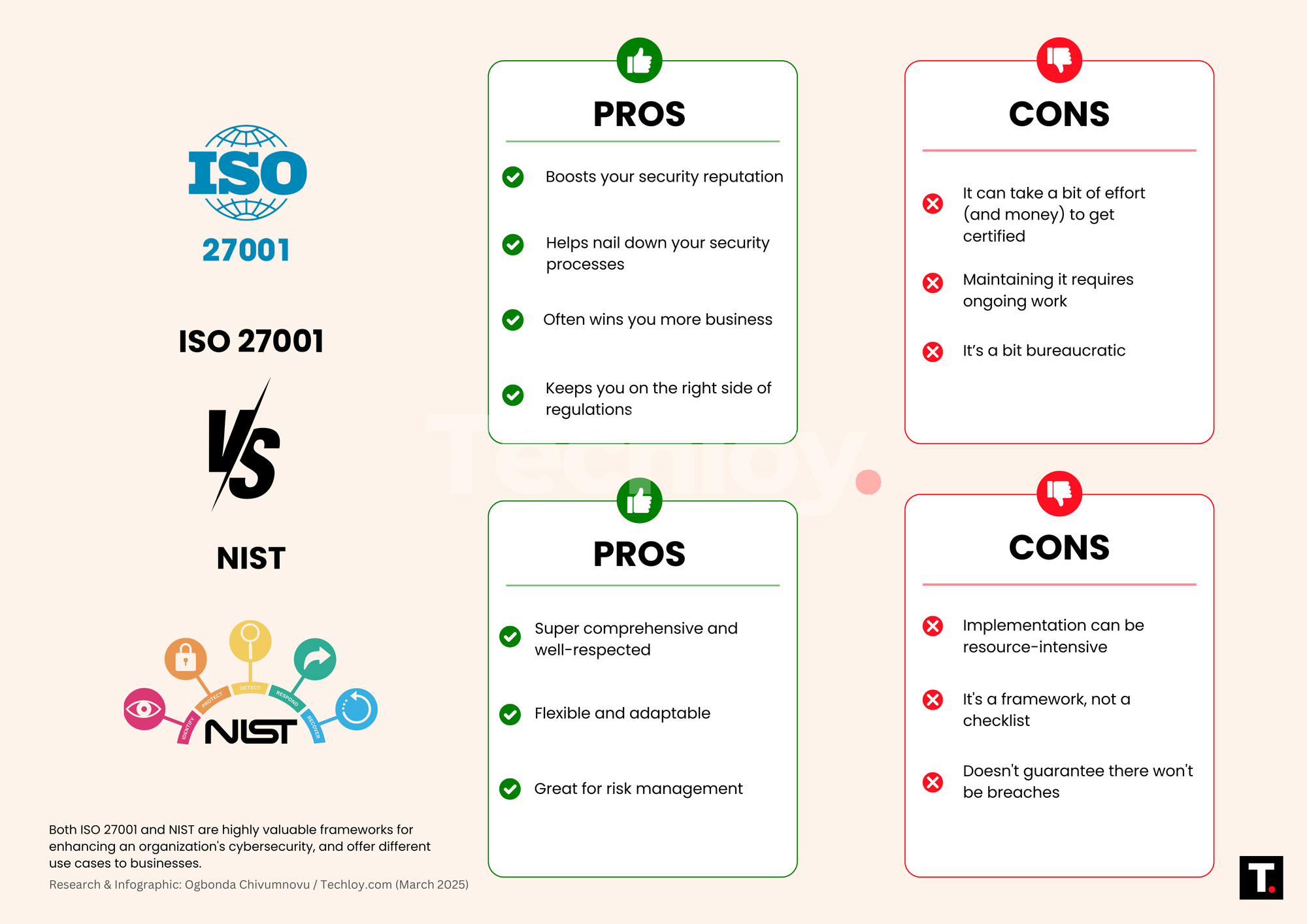ISO 27001 vs. NIST: Which Cybersecurity Framework Is Right for Your Business?
Choosing between ISO 27001 and NIST comes down to your business goals, industry needs, and compliance requirements.

In today’s digital world, cyber risks are skyrocketing—over 70% of businesses faced cyber threats in 2023 alone, according to Statista.
With stakes this high, choosing the right Cybersecurity framework isn’t just important; it’s essential. But with options like ISO 27001 and NIST, how do you know which one fits your business best? Let’s break it down.

What are ISO 27001 and NIST?
ISO 27001 is the gold standard for information security, created by the International Organization for Standardization (ISO) and the International Electrotechnical Commission (IEC). It’s part of the ISO/IEC 27000 series, which tackles everything about keeping information safe. Think of ISO 27001 as the star player—it lays out exactly how to manage security, from cybersecurity to privacy protection, in a way that works for any business.
On the other hand, the NIST Cybersecurity Framework (CSF) is a flexible set of guidelines created by the National Institute of Standards and Technology to help businesses manage and reduce cyber risks. Think of it as a roadmap that walks you through five key steps: identifying your assets, protecting your systems, detecting threats, responding to incidents, and recovering from breaches. It’s all about building a stronger cybersecurity foundation for your organization.
/1. Purpose
Ever wonder how companies keep all their sensitive data under wraps? ISO 27001 is a big part of it. It's a guide to building a solid security system–an 'Information Security Management System' (ISMS)–to ensure company info is private, trustworthy, and always accessible.
On the other hand, NIST frameworks, like the Cybersecurity Framework (CSF), focus on helping organizations manage and reduce cyber risks. They provide a voluntary set of guidelines to improve security practices.
So, which wins? If you need a structured, globally recognized system, ISO 27001 takes the crown. However, if you want a flexible, hands-on approach, NIST is your best bet. Both are winners—it just depends on your needs.
/2. Focus
At its core, ISO 27001 is about protecting valuable information through a structured, process-driven approach. It helps organizations identify and manage security risks systematically.
Meanwhile, NIST emphasizes real-time security, focusing on continuous monitoring, threat detection, and rapid response. It’s all about staying ahead of risks and minimizing their impact.
So, which wins? For businesses that thrive on structure and need a globally recognized certification, ISO 27001 takes the prize. But if your organization values flexibility and real-time threat management, NIST is the clear winner. Both are top-tier—it just depends on how your business operates.

/3. Adoption
ISO 27001 is widely adopted across industries and regions, making it a go-to standard for businesses with international partners or strict data regulations.
In contrast, NIST is primarily a U.S.-based framework, especially popular in government and military sectors. However, its practical approach is gaining traction in private companies as well.
So, which wins? ISO 27001 as it's more widely adopted across industries and regions, while NIST is usually limited to the U.S.
/4. Certification
One of ISO 27001’s standout features is its formal certification process. Organizations can undergo third-party audits to earn certification, proving their commitment to security.
Conversely, NIST doesn’t offer a formal certification. Instead, compliance is demonstrated through internal or third-party assessments, making it more flexible but less standardized.
So, which wins? This win would also go to ISO 27001 because of its global recognition in certifications. However, if you want a more flexible framework, NIST is your best bet.
/5. Flexibility
ISO 27001 takes a structured approach, with 14 security domains and 114 specific controls. While it allows some customization, the core requirements are fixed.
On the other hand, NIST is highly flexible, designed to adapt to different industries, company sizes, and risk levels. Organizations can tailor it to their unique needs.
So, which wins? For flexibility, it isn't a fair comparison between ISO 27001 and NIST, as NIST is far more flexible that ISO 27001 whose core requirements are rigid. So, this win goes to NIST.
/6. Key Components
ISO 27001 is organized into 14 security domains, covering areas like asset management, access control, cryptography, and incident response. These domains include 114 specific controls for a comprehensive security approach.
Meanwhile, NIST uses five core functions—Identify, Protect, Detect, Respond, and Recover—as the foundation of its framework. Each function is broken into categories and subcategories, offering detailed guidance for building a strong security posture.
So, which wins? While ISO 27001 is the heavyweight champion in terms of depth and coverage, NIST wins for its streamlined, easy-to-follow structure—making it more accessible for businesses looking to strengthen their security without getting lost in the weeds.
/7. Best For
If you need a structured, globally recognized certification, ISO 27001 is ideal. It’s particularly suited for industries like banking, healthcare, and tech, where strict data regulations are the norm.
In contrast, NIST is perfect for organizations that need a flexible, hands-on cybersecurity plan. It’s especially useful for U.S.-based companies, including government contractors and critical infrastructure providers.
So, which wins? In terms of suitability, it’s a bit of a draw—both frameworks shine in different arenas. So, if you need a badge of honor to show you’re security-compliant, ISO 27001 is your winner. But if you want a hands-on playbook to strengthen your defenses without the formality, NIST takes the crown.

Conclusion: Which One Is Best For Your Business?
Choosing between ISO 27001 and NIST comes down to your business goals, industry needs, and compliance requirements. Here’s the lowdown:
- ISO 27001 is your go-to if you’re a global player needing a recognized certification to prove your security chops to clients and partners. It’s all about building a solid Information Security Management System (ISMS) that works across industries.
- NIST (like NIST CSF or NIST 800-53) is perfect for U.S.-based businesses, especially in government, defense, or critical infrastructure. It’s flexible, constantly updated, and great for tackling evolving cyber threats.
- Why not both? Many businesses combine the two—using NIST for risk assessments and ISO 27001 for certification. It’s like having the best of both worlds!
The right choice depends on your risk tolerance, compliance needs, and long-term security game plan. So, what’s your move?






